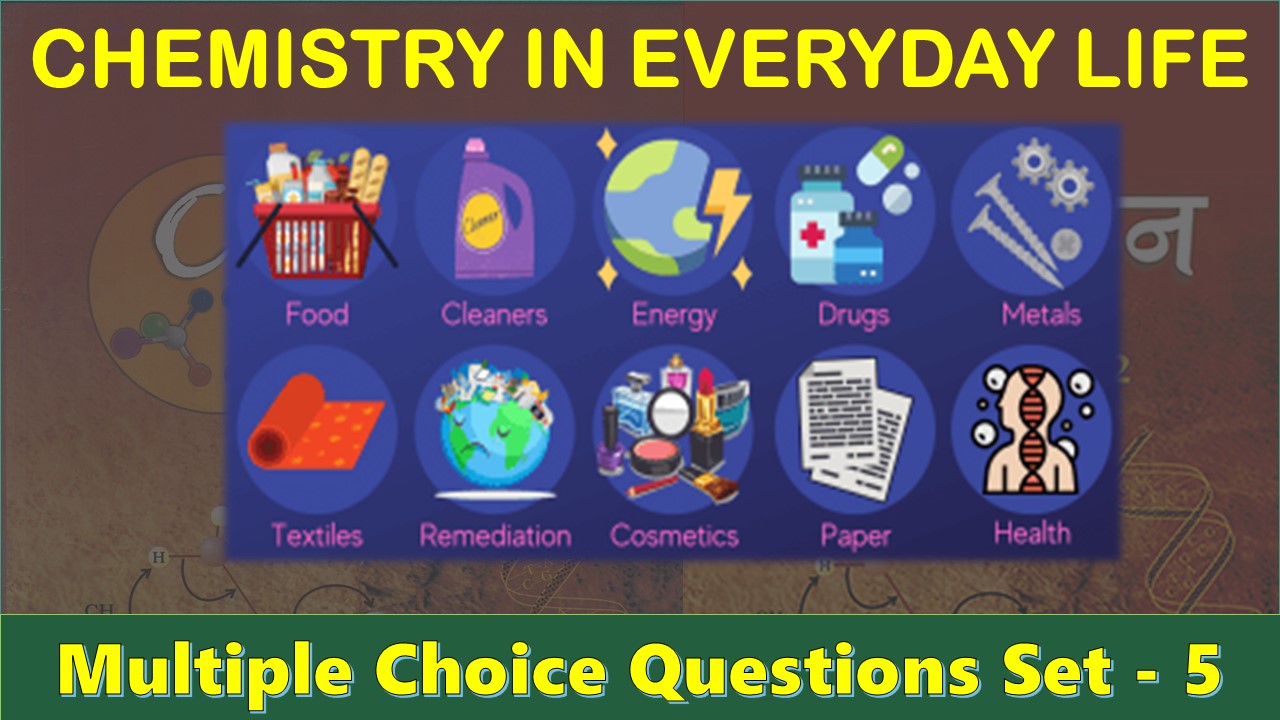CBSE Class 12 Chemistry in Everyday Life with Answers Multiple Choice Questions with Answers. MCQ Questions Class 12 Chemistry in Everyday Life with Answers with Answers Is Prepared Based on Latest Exam Pattern. Students can solve NCERT Class 12 Chemistry in Everyday Life with Answers MCQs with Answers to know their preparation level.
Students who are searching for NCERT MCQ Questions for Class 12 Chemistry in Everyday Life with Answers with Answers are compiled here to get good practice on all fundamentals. Know your preparation level on MCQ Questions for Class 12 Chemistry in Everyday Life with Answers with Answers. You can also verify your answers from our provided MCQ Class 12 Chemistry in Everyday Life with Answers with Answers. So, ace up your preparation with MCQ of Class 12 Chemistry Examinations.
MCQ Questions Class 12 Chemistry in Everyday Life with Answers - Set - 5
Question 1:
The main cause of acidity in the stomach is
(a) release of extra gastric acids which decrease the pH level
(b) indigestion and pain in large intestine
(c) increase the pH level in the stomach
(d) release of extra bile juice which increases alkaline medium in stomach
Correct Answer – (A)
Question 2:
Which of the following is a narcotic analgesic?
(a)Ibuprofen
(b) Aspirin
(c) Paracetamol
(d) Morphine
Correct Answer – (D)
Question 3:
Which of the following can be used as an analgesic without causing addiction?
(a) Morphine
(b) Aspirin
(c) Heroin
(d) Codeine
Correct Answer – (B)
Question 4:
A drug which acts as antipyretic as analgesic is
(a) chloroquin
(b) penicillin
(c) chlorodiazeposide
(d) 4-acetamidophenol
Correct Answer – (D)
Question 5:
Drugs that bind to the receptor site and inhibit its natural function are called
(a) agonistic drugs
(b) antagonists drugs
(c) antimicrobial drugs
(d) allosteric drugs
Correct Answer – (B)
MCQ Questions Class 12 Chemistry in Everyday Life With Answers
Question 6:
Antihistamines are not helpful
(a) in curing nasal allergies
(b) in treating rashes caused by itching
(c) in bringing down acute fever
(d) in vasodilation
Correct Answer – (C)
Question 7:
Which of the following will not act as a tranquilizer?
(a) Equanil
(b) Analgin
(c) Meprobamate
(d) Chlordiazepoxide
Correct Answer – (B)
Question 8:
The drugs which are given to the patients suffering from anxiety and metnal tension are known as
(a) tranquilizers
(b) analgesics
(c) antimicrobials
(d) antibiotics
Correct Answer – (A)
Question 9:
Barbituric acid and its derivatives are well known as
(a) tranquilizers
(b) antiseptics
(c) analgesics
(d) antipyretics
Correct Answer – (A)
Question 10:
Some drugs do not bind to the enzyme’s active site, instead bind to a different site of enzyme. This site is called
(a) allosteric site
(b) substrate site
(c) ionic site
(d) competitive site
Correct Answer – (A)
- NCERT Solutions Class 11 Chemistry Chapter 1 : Some Basic Concepts of Chemistry
- NCERT Solutions Class 11 Chemistry Chapter 2 : Structure Of The Atom
- NCERT Solutions Class 11 Chemistry Chapter 3 : Classification of Elements and Periodicity in Properties
- NCERT Solutions Class 11 Chemistry Chapter 4 : Chemical Bonding and Molecular Structure
- NCERT Solutions Class 11 Chemistry Chapter 5 : States of Matter
- NCERT Solutions Class 11 Chemistry Chapter 6 : Thermodynamics
- NCERT Solutions Class 11 Chemistry Chapter 7 : Equilibrium
- NCERT Solutions Class 11 Chemistry Chapter 8 : Redox Reactions
- NCERT Solutions Class 11 Chemistry Chapter 9 : Hydrogen
- NCERT Solutions Class 11 Chemistry Chapter 10 : The s-Block Elements
- NCERT Solutions Class 11 Chemistry Chapter 11 : The p-Block Elements
- NCERT Solutions Class 11 Chemistry Chapter 12 : Organic Chemistry: Some Basic Principles and Techniques
- NCERT Solutions Class 11 Chemistry Chapter 13 : Hydrocarbons
- NCERT Solutions Class 11 Chemistry Chapter 14 : Environmental Chemistry




